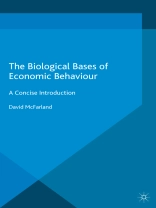Human genetics has changed little over the past 20, 000 years, but human economic behaviour has changed a lot. These changes are probably due to human cultural evolution. But studies of human hunter-gatherers, and of a variety of other animal species, show that their micro-economic behaviour is much the same. Whereas the standard economic analysis focuses on money, the biological approach brings time and energy into the analysis. Moreover, humans and other animals tested under laboratory conditions do not exhibit the complexity of the results of field studies. In other words, results obtained in the real world are not the same as those obtained in the laboratory.
The Biological Bases of Economic Behaviour invites readers to approach micro-economics from a biological viewpoint, in a clear and introductory manner.
İçerik tablosu
Contents
List Of Figures
Preface
Glossary
PART I: THE EVOLUTION OF ECONOMIC BEHAVIOUR
1.1 Evolution By Natural Selection
1.1.1 Life History Strategy
1.1.2 Kith And Kin
1.1.3 Reciprocal Altruism
1.1.4 Cultural Evolution
1.1.5 Tool Use And Intelligence
1.2 Human Evolution
1.2.1 Recent Genetic Changes
1.2.2 Human Cultural Evolution
1.2.3 The Neolythic Revolution
Points To Remember
Further Reading
Essential Reading
PART II: THE ECONOMIC BEHAVIOUR OF THE INDIVIDUAL
2.1 A Biological Approach
2.1.1 The Animal As An Economic Consumer
2, 1, 2 The Supermarket Analogy
2.1.3 Time And Energy Budgets In Animals
2.2 Animal And Human Economics
2.2.1 Problems With Microeconomics
2.2.2 Specific Hungers
Points To Remember
Further Reading
Essential Reading
PART III: BEHAVIOURAL ECONOMICS
3.1 The Experimental Situation
3.1.1 The Sterile Environment
3.1.2 The Captive Animal
3.2 The Real World
3.2.1 Animals In The Real World
3.2.2 Humans In The Real World
3.2.3 Hoarding And Caching
3.3 The Rationality Muddle
3.3.1 Rational Choice Theory
3.3.2 Biological Rationality
Points To Remember
Further Reading
Essential Reading
PART IV: THE BIOLOGICAL BASES OF DECISION MAKING
4.1 Decisions
4.1.1 Recapitulation
4.1.2 The Biological View
4.1.3 Functionional Aspects Of Decision Making
4.1.4 Trade-Off
4.2 ‘Voluntary’ Decisions
4.2.1 Introspection
4.2.2 The Teleological Imperative
4.2.3 Whither Homo Economicus?
Points To Remember
Further Reading
Essential Reading
Glossary
Endnotes
Yazar hakkında
David Mc Farland studied zoology (BSc Hons) and psychology (DPhil). He researched and published in the fields of animal behaviour, philosophy, physiology, psychology and robotics. He retired in 2000, and is an Emeritus Fellow of Balliol College, Oxford, UK. Since retiring, he has published seven books.












